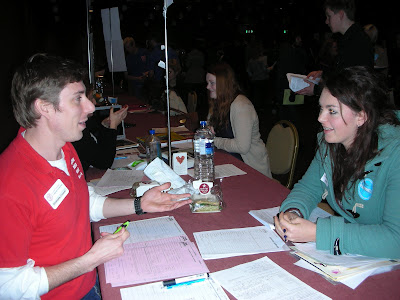 Posted by Christopher Colahan, Managing Director at Peconic Dunes 4-H Camp
Posted by Christopher Colahan, Managing Director at Peconic Dunes 4-H CampWhenever I tell someone what I do, they always reply by asking, “So…what do you do the rest of the year?” It’s a running joke among camp directors. I don’t think that people actually believe that camp pops out in June like an emergency life raft. I think that most people have just never given it much thought.

One thing that requires a lot of off-season time is recruiting and hiring staff. Peconic Dunes employs seventy-eight people during the summer. Forty-four of those people are cabin counselors. When I took the reigns of P Dunes six years ago we didn’t have many “homegrown” counselors, people who had grown-up with P Dunes as campers and successfully transitioned into new roles as mentors and instructors. This summer we’ll have seventeen cabin counselors who were formerly campers, young adults who successfully completed our Counselor-In-Training program, and are now ready to be the kind of mentors they looked up to as campers. In fact, this summer two CIT graduates, Jon Stegner and Moriah Santiago (class of 2008 and 2009 respectively) will serve as Unit Leaders in boys and girls camp.
Returning counselors helping at the fair.
L-R Ben Brookes, Adrian Mooney, Chelsea Duffy, Izzy Todd, Chris Colahan, and Paul James
Recruiting brand new people into the P Dunes community is just as exciting as seeing people you met when they were twelve mature into responsible, fun young adults. For the past seven years P Dunes has recruited staff from abroad and for the past four years, I’ve had the privilege to travel to the Camp America Camp Director Recruiting Fair in London, England. Each year about a thousand young men and women line up outside Kensington Town Hall hoping to be selected to work at one of fifty camps recruiting that day.
The Royal Palace
This year P Dunes was very fortunate to have some of its returning English team come out to help interview candidates, ensuring that we recruit the best new members for our 2012 team. Paul, Izzy, Adrian, Chelsea, and Ben offered invaluable help. Between the six of us we met with about a hundred people and hired eight new team members. Some of the people who will be at P Dunes this summer are Scout leaders, schoolteachers, people pursuing degrees in elementary education, mechanical engineering, and social work, and one former English Junior National Kayaking Champion. We are really excited about the new folks and know when you meet them you will be too!
Lastly, I'd like to say "thank you" to our partners and friends at Camp America (CA) for coordinating another successful Recruiting Fair. Each year the folks at CA thoroughly screen tens of thousands of applicants to ensure that only the best suited to work with children are eligible for camp employment. Thanks Kristin, Duffy, Dennis, Jenna, Allyson, and Andrew!














